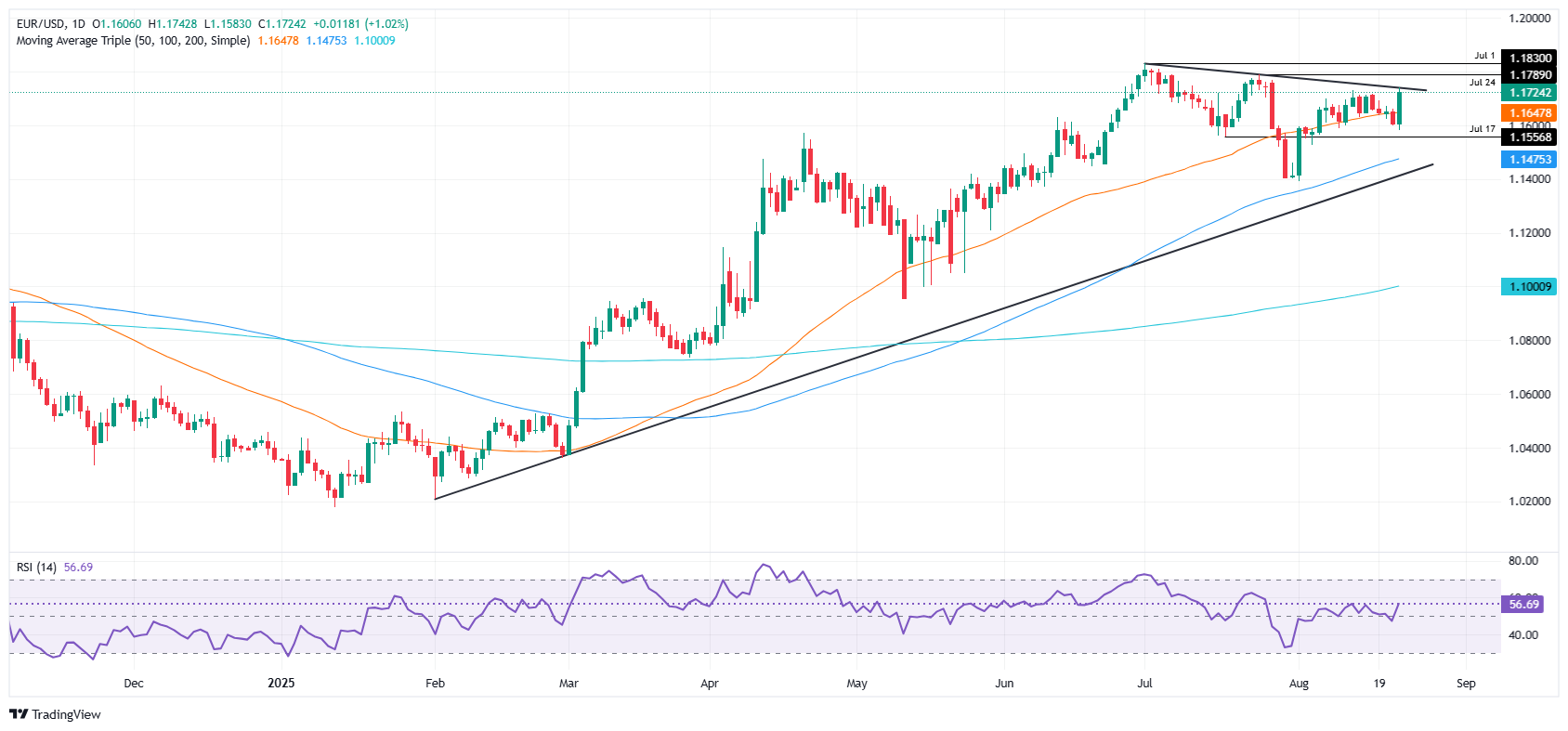- EUR/USD rallies nearly 1% as Powell signaled policy flexibility and acknowledged downside risks in the US labor market.
- Traders boosted odds of a 25 bps Fed cut in September to 90%, up sharply from 72% on Thursday.
- Outcome hinges on Core PCE, CPI, and Nonfarm Payrolls before September, with risks skewed toward inflationary pressures.
EUR/USD skyrockets during the North American session after Federal Reserve (Fed) Chairman Jerome Powell leaned dovish at his Jackson Hole speech, opening the door for a resumption of the easing cycle. The pair trades at 1.1718, up by 0.97%.
Market participants began to price in a Fed rate cut in September as the Fed Chair Jerome Powell said that “The stability of the unemployment rate and other labor market measures allows us to proceed carefully as we consider changes to our policy stance.”
He added that there’s a “reasonable base case” to think that tariffs would create a “one-time” increase in inflation. However, he remained cautious, emphasizing that risks of inflation are tilted to the upside and risks to employment to the downside.
Following Powell’s remarks, traders increased their bets that the Fed will reduce rates at the September meeting, as the CME FedWatch Tool reveals an 85% chance–up from 72% a day ago—of a 25 basis points rate cut.
Despite this sudden shift, the outcome of the September meeting is yet to be certain. Before the monetary policy decision, two inflation reports await—the Core Personal Consumption Expenditures (PCE) Price Index for July, and August’s Consumer Price Index (CPI)— and August’s Nonfarm Payrolls.
Two red-hot inflation reports and strong employment data could prevent the Fed from cutting rates, pushing that decision towards the last quarter of 2025.
Daily digest market movers: EUR/USD rises with Fed members split on monetary policy
- The Greenback fell after Powell’s comments. The US Dollar Index (DXY), which tracks the performance of the US Dollar against a basket of six currencies, drops more than 1% to 97.55.
- Fed Chair Powell added, “The baseline outlook and the shifting balance of risks may warrant adjusting our policy stance.” He added that “the stability of the unemployment rate and other labor market measures allows us to proceed carefully.”
- Cleveland Fed President Beth Hammack said that she heard that Powell is open-minded about the policy outlook, and she reiterated her stance to get inflation back to target. She added that the Fed is a small distance away from the neutral rate and that the “Fed needs to be cautious about any move to cut rates.”
- EUR/USD is set to extend its gains due to central bank monetary policy divergence. The European Central Bank (ECB) is projected to hold rates unchanged at the next meeting, while the Fed, although the chances have trimmed, is expected to resume its easing cycle.
- The Euro shrugged off a worse-than-expected Gross Domestic Product (GDP) print in Germany, as the economy contracted -0.3 QoQ—estimates were of -0.1%—in the second quarter of 2025. Yearly, the economy dipped from 0.4% to 0.2%.
- Expectations that the Fed will reduce rates at the September meeting continued to trend higher. Across the pond, the ECB is expected to hold rates with odds standing at 94%, and a slim 6% chance of a 25-basis-point (bps) rate cut.
Technical outlook: EUR/USD rises and clears 1.17, buyers eye YTD high of 1.1829
EUR/USD uptrend resumed on Friday, and after reaching a higher high of 1.1742, expectations had grown for an advance towards the 1.1800 figure. Momentum is bullish as depicted by the Relative Strength Index (RSI), with the index trending higher and poised to surpass its latest peak.
The pair’s first resistance would be 1.1750, followed by the 1.1800 mark. If surpassed, the next stop would be the yearly high of 1.1829. On the other hand, a daily close below 1.17 opens the door for testing the August 19 high of 1.1692 and 1.1650.

Euro FAQs
The Euro is the currency for the 19 European Union countries that belong to the Eurozone. It is the second most heavily traded currency in the world behind the US Dollar. In 2022, it accounted for 31% of all foreign exchange transactions, with an average daily turnover of over $2.2 trillion a day.
EUR/USD is the most heavily traded currency pair in the world, accounting for an estimated 30% off all transactions, followed by EUR/JPY (4%), EUR/GBP (3%) and EUR/AUD (2%).
The European Central Bank (ECB) in Frankfurt, Germany, is the reserve bank for the Eurozone. The ECB sets interest rates and manages monetary policy.
The ECB’s primary mandate is to maintain price stability, which means either controlling inflation or stimulating growth. Its primary tool is the raising or lowering of interest rates. Relatively high interest rates – or the expectation of higher rates – will usually benefit the Euro and vice versa.
The ECB Governing Council makes monetary policy decisions at meetings held eight times a year. Decisions are made by heads of the Eurozone national banks and six permanent members, including the President of the ECB, Christine Lagarde.
Eurozone inflation data, measured by the Harmonized Index of Consumer Prices (HICP), is an important econometric for the Euro. If inflation rises more than expected, especially if above the ECB’s 2% target, it obliges the ECB to raise interest rates to bring it back under control.
Relatively high interest rates compared to its counterparts will usually benefit the Euro, as it makes the region more attractive as a place for global investors to park their money.
Data releases gauge the health of the economy and can impact on the Euro. Indicators such as GDP, Manufacturing and Services PMIs, employment, and consumer sentiment surveys can all influence the direction of the single currency.
A strong economy is good for the Euro. Not only does it attract more foreign investment but it may encourage the ECB to put up interest rates, which will directly strengthen the Euro. Otherwise, if economic data is weak, the Euro is likely to fall.
Economic data for the four largest economies in the euro area (Germany, France, Italy and Spain) are especially significant, as they account for 75% of the Eurozone’s economy.
Another significant data release for the Euro is the Trade Balance. This indicator measures the difference between what a country earns from its exports and what it spends on imports over a given period.
If a country produces highly sought after exports then its currency will gain in value purely from the extra demand created from foreign buyers seeking to purchase these goods. Therefore, a positive net Trade Balance strengthens a currency and vice versa for a negative balance.







